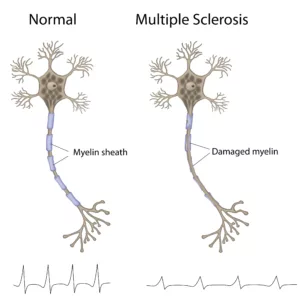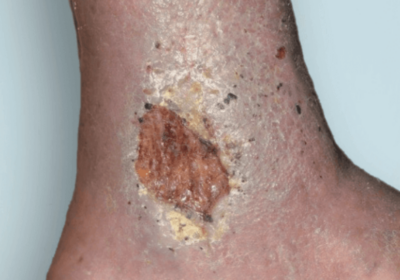Leading the Way in Multiple Sclerosis Treatment: Maurya’s Expertise

- Multiple sclerosis (MS) is a chronic and disabling neurological disease that affects the central nervous system (CNS), which includes the brain and spinal cord. It is characterized by a wide range of symptoms and can vary greatly in its presentation from one individual to another.
- MS is an autoimmune condition in which the immune system mistakenly attacks the protective covering of nerve fibers called Myelin. This attack on Myelin leads to inflammation, damage to the underlying nerve fibers, and the formation of scar tissue (Sclerosis).
- As per Ayurveda, Multiple Sclerosis is caused due to the aggravation of Pitta and Kapha Doshas (bio-energies that govern the overall functioning of the human body as per Ayurveda).
KEY FEATURE
Demyelination
The primary pathology of Multiple Sclerosis is the demyelination of nerve fibers in the CNS. Myelin acts as an insulating sheath around nerve fibers, allowing for efficient transmission of electrical signals. When Myelin is damaged or destroyed, nerve impulses are disrupted, leading to a variety of neurological symptoms.

SYMPTOMS OF MULTIPLE SCLEROSIS
| Fatigue | Visual disturbances |
| Cognitive changes | Difficulty with balance |
| Coordination problems | Numbness or tingling |
| Muscle weakness | Pain |
| Problems with bladder and bowel function. | Constipation |
| Difficulties with Speech and Swallowing |
Symptoms can vary in severity and may come and go (relapses and remissions). There are several different clinical courses of MS, including Relapsing-Remitting MS (RRMS), Secondary Progressive MS (SPMS), Primary Progressive MS (PPMS), and Progressive-Relapsing MS (PRMS). Each type has its own characteristic disease course.

PROGNOSIS
- The course of MS varies widely among individuals. Some people may experience mild symptoms and have long periods of remission, while others may have more severe disability and a faster progression of the disease. Prognosis is influenced by various factors, including the type of Multiple Sclerosis, the age at onset, and the individual’s response to treatment.
- It’s important for individuals with Multiple Sclerosis to work closely with healthcare professionals, including neurologists, to develop a personalized treatment plan and management strategy tailored to their specific needs and circumstances.
- Early diagnosis and appropriate medical care can help improve the quality of life for people living with Multiple Sclerosis. Multiple Sclerosis (MS) is a complex disease with various clinical courses, and it can present differently in individuals.
TYPES OF MULTIPLE SCLEROSIS
The four primary types of Multiple Sclerosis are:
1. Relapsing-Remitting MS (RRMS):
-
- RRMS is the most common form of MS, affecting about 85% of people diagnosed with the condition.
- In RRMS, individuals experience periods of relapse or exacerbation, during which new symptoms or the worsening of existing symptoms occur. These relapses are followed by periods of remission, during which symptoms may partially or completely improve.
- Some individuals with RRMS may go on to develop a more progressive form of the disease over time.
2. Secondary Progressive MS (SPMS):
- SPMS follows a relapsing-remitting course initially, similar to RRMS. However, over time, it transitions into a progressive phase.
- In SPMS, there may be a gradual worsening of symptoms and disability, even between relapses. Relapses may become less frequent or stop altogether.
3. Primary Progressive MS (PPMS):
- PPMS is characterized by a continuous progression of symptoms and disability from the onset, without distinct relapse and remission phases.
- Unlike RRMS and SPMS, PPMS typically lacks the clear-cut relapses seen in those forms.
4. Progressive-Relapsing MS (PRMS)
- PRMS is a relatively rare form of MS, accounting for a small percentage of cases.
- It is characterized by a steady progression of the disease from the beginning, with occasional acute relapses that may or may not result in symptom improvement.
DIAGNOSIS OF MULTIPLE SCLEROSIS
The diagnosis of MS typically involves a combination of clinical evaluation, medical history, neurological exams, imaging studies (such as MRI), and sometimes cerebrospinal fluid analysis.
TREATMENT FOR MULTIPLE SCLEROSIS
- You can expect an integrated therapy for Multiple Sclerosis at Maurya Ayurveda Hospital, which includes sessions of Ayurveda, Physiotherapy, Acupuncture, Yoga and Speech-Swallowing Therapy if required, as per the condition and severity of the disease of the patient. Therefore, we can rightfully say that the treatment is tailored to the patient’s needs. We have a strong team of Ayurveda Physicians, Naturopathy Physicians, Physiotherapists, Speech Therapists and Therapists to guide you through, leading to a blissful recovery.
- Initially, a consultation is necessary to work out the cause and nature of the disease, followed by any blood work if required. A treatment plan is then formulated by our expert Chief Physician, Dr Kasim, tailored to the patient’s needs.
Multiple Sclerosis Rehabilitation Therapy at our hospital involves:
1. Ayurvedic Internal Medications
Ayurvedic medicines are prescribed by expert physicians at Maurya Ayurveda Hospital by taking into account the patient’s body constitution and nature and severity of the MS.
2. Ayurvedic External Therapy
Ruksha Sweda and Udvartana is considered one of the best external Ayurvedic therapy for Multiple Sclerosis. Depending on the nature and severity of the symptoms, other Ayurveda therapies like Shirodhara, Nasya etc are also done as a part of Ayurveda treatment.
3. Physiotherapy
Physiotherapy, along with Ayurveda Rehabilitation Therapy forms an integral part in the treatment of Multiple Sclerosis. Stretching Exercises, Strengthening exercises, Exercises for Balance and Coordination, Sitting and Standing exercises, Active and Passive Movements, Electrical Stimulation, Ankle Foot Orthoses and Breathing exercises make up the major portion of Physiotherapy sessions. These exercises are customized as per the severity of the symptoms of the patient.
4. Acupuncture
Acupuncture involves the insertion of thin needles into specific points on the body to alleviate various symptoms of Multiple Sclerosis. Individuals with MS report benefits such as reduced pain, muscle stiffness, and improved relaxation from Acupuncture therapy.
5. Swallowing and Speech Therapy
Speech and swallowing therapy is a valuable specialized therapy focused on addressing speech difficulties and swallowing problems that can arise due to the effects of MS on the central nervous system. Speech therapists work with MS patients to improve articulation, voice quality, and communication skills while also addressing issues like dysphagia (difficulty swallowing). Through targeted exercises and techniques, speech and swallowing therapy can help enhance a patient’s quality of life, ensuring they can communicate effectively and maintain proper nutrition and hydration.
6. Diet
Patients are required to adhere to a strict diet that is not too spicy, salty and sour to attain optimal results from treatment. A well-thought diet plan designed by expert Naturopathic physicians will be given.





Leave a Reply
You must be logged in to post a comment.